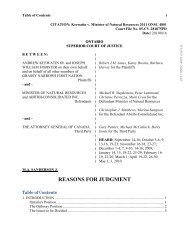Cronk v. Canadian General Insurance Co., 1995 CanLII 814 (ON CA)
Cronk v. Canadian General Insurance Co., 1995 CanLII 814 (ON CA)
Cronk v. Canadian General Insurance Co., 1995 CanLII 814 (ON CA)
You also want an ePaper? Increase the reach of your titles
YUMPU automatically turns print PDFs into web optimized ePapers that Google loves.
indicates that the rationale of principle assumes that each person is as worthy as<br />
any other, that each must be treated with equal concern according to some<br />
coherent conception of what that means. Another way of saying this is that we<br />
expect litigants in equal positions will obtain an equal result unless there is a good<br />
reason to differentiate: see "Legal Values and Judicial Decision-Making", supra, at<br />
p. 14.<br />
A number of reasons have been advanced to differentiate between management<br />
executives and ordinary employees. I will deal with them in three groups.<br />
The first group consists of the following propositions: (a) the work skills of a<br />
clerical employee are more general and more relevant to a broader range of<br />
employers, while the skills of management employees are relevant to a narrower<br />
range of businesses; (b) a clerical employee can apply for a greater number of<br />
positions than can a senior management employee; (c) senior management<br />
employees, being more specialized, require more training and upgrading. These<br />
three propositions are all different ways of asserting as a fact the assumption that it<br />
takes longer for a senior management employee to find work than a clerical<br />
employee. It is this very factual assumption that is called into question by<br />
MacPherson J. When a fact is in dispute, repeating the factual proposition by<br />
rewording it does not provide a rational reason to accept the disputed fact. One can<br />
just as easily say the following by way of rebuttal:<br />
(a) Although there are a greater number of positions available to a person<br />
with clerical skills, there are also greater number of persons with clerical<br />
skills seeking those positions. At the same time computerization has<br />
reduced the number of persons required to do various aspects of clerical<br />
work.<br />
(b) The contacts that senior management employees are likely to make<br />
because of the positions they occupy are likely to assist them to find reemployment<br />
whereas a clerical employee is likely to have to call on<br />
prospective employers "cold."<br />
(c) Senior management employees, being already better educated, can more<br />
readily learn new ways to manage. A management employee, who, like Ms<br />
<strong>Cronk</strong>, is 55 years of age and has 27 years of service, may not be able to<br />
obtain comparable employment but is more likely to have the money to<br />
start his or her own business or to buy an interest in an existing one. It is<br />
unlikely that a clerical employee would be able to do this.<br />
The second reason given for differentiating between a clerical and a management<br />
employee is that in the case of economic downsizing, senior manager is more<br />
likely to be implicated in the downsizing and, presumably because of the stigma<br />
attached to downsizing, is likely to experience difficulty in securing employment.
















